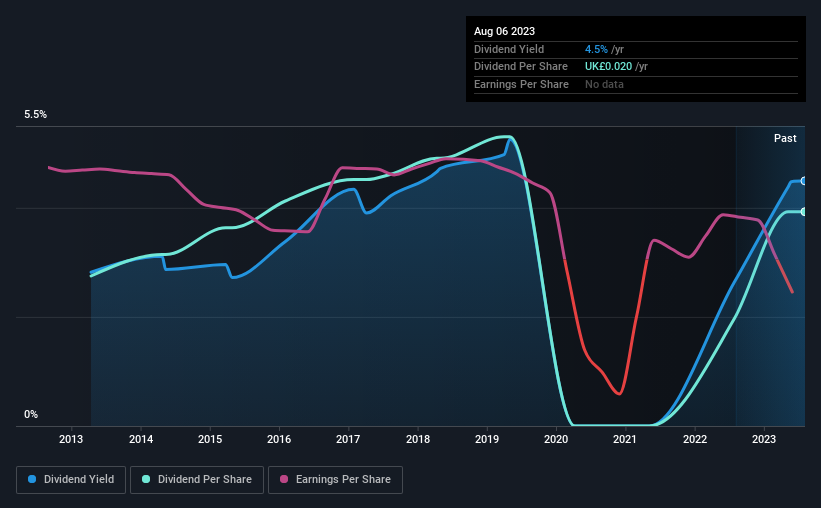Here's Why We're Wary Of Buying Rotala's (LON:ROL) For Its Upcoming Dividend
Rotala PLC (LON:ROL) stock is about to trade ex-dividend in three days. The ex-dividend date is one business day before the record date, which is the cut-off date for shareholders to be present on the company's books to be eligible for a dividend payment. It is important to be aware of the ex-dividend date because any trade on the stock needs to have been settled on or before the record date. Therefore, if you purchase Rotala's shares on or after the 10th of August, you won't be eligible to receive the dividend, when it is paid on the 25th of August.
The company's next dividend payment will be UK£0.005 per share. Last year, in total, the company distributed UK£0.02 to shareholders. Based on the last year's worth of payments, Rotala stock has a trailing yield of around 4.5% on the current share price of £0.445. We love seeing companies pay a dividend, but it's also important to be sure that laying the golden eggs isn't going to kill our golden goose! We need to see whether the dividend is covered by earnings and if it's growing.
See our latest analysis for Rotala
If a company pays out more in dividends than it earned, then the dividend might become unsustainable - hardly an ideal situation. Rotala's dividend is not well covered by earnings, as the company lost money last year. This is not a sustainable state of affairs, so it would be worth investigating if earnings are expected to recover. With the recent loss, it's important to check if the business generated enough cash to pay its dividend. If Rotala didn't generate enough cash to pay the dividend, then it must have either paid from cash in the bank or by borrowing money, neither of which is sustainable in the long term. Luckily it paid out just 2.0% of its free cash flow last year.
Click here to see how much of its profit Rotala paid out over the last 12 months.
Have Earnings And Dividends Been Growing?
Businesses with shrinking earnings are tricky from a dividend perspective. Investors love dividends, so if earnings fall and the dividend is reduced, expect a stock to be sold off heavily at the same time. Rotala was unprofitable last year and, unfortunately, the general trend suggests its earnings have been in decline over the last five years, making us wonder if the dividend is sustainable at all.
Many investors will assess a company's dividend performance by evaluating how much the dividend payments have changed over time. Rotala has delivered 3.6% dividend growth per year on average over the past 10 years.
We update our analysis on Rotala every 24 hours, so you can always get the latest insights on its financial health, here.
The Bottom Line
Should investors buy Rotala for the upcoming dividend? We're a bit uncomfortable with it paying a dividend while being loss-making. However, we note that the dividend was covered by cash flow. Overall it doesn't look like the most suitable dividend stock for a long-term buy and hold investor.
Although, if you're still interested in Rotala and want to know more, you'll find it very useful to know what risks this stock faces. For example, we've found 4 warning signs for Rotala (2 are a bit unpleasant!) that deserve your attention before investing in the shares.
A common investing mistake is buying the first interesting stock you see. Here you can find a full list of high-yield dividend stocks.
Have feedback on this article? Concerned about the content? Get in touch with us directly. Alternatively, email editorial-team (at) simplywallst.com.
This article by Simply Wall St is general in nature. We provide commentary based on historical data and analyst forecasts only using an unbiased methodology and our articles are not intended to be financial advice. It does not constitute a recommendation to buy or sell any stock, and does not take account of your objectives, or your financial situation. We aim to bring you long-term focused analysis driven by fundamental data. Note that our analysis may not factor in the latest price-sensitive company announcements or qualitative material. Simply Wall St has no position in any stocks mentioned.

